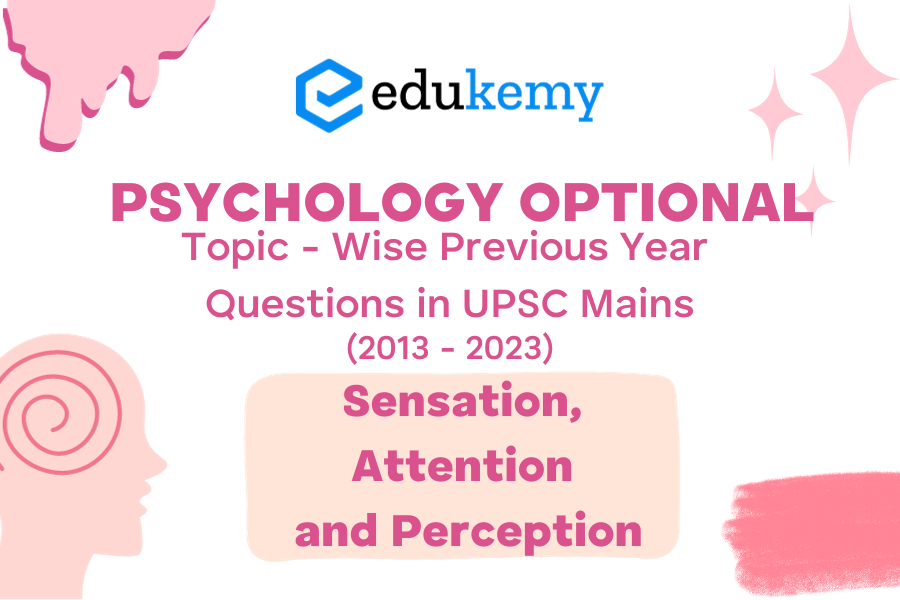
Are you an aspiring civil servant gearing up for the UPSC Mains examination? If you’ve chosen psychology as your optional subject, then you’re in the right place! In this comprehensive blog series, we’ll be delving into the previous year questions from 2013 to 2023 on the fascinating topics of Sensation, Attention, and Perception. These three concepts are at the very heart of psychology, and a thorough understanding of them is crucial for excelling in your UPSC Mains examination.
Throughout this series, we’ll not only provide you with a detailed analysis of the questions but also offer insights, tips, and techniques to tackle them effectively. Sensation, Attention, and Perception are not just theoretical concepts; they hold practical importance in understanding human behavior, decision-making, and social interactions. By the end of this blog series, you’ll be better equipped to handle the psychological aspects of the UPSC Mains and gain a deeper appreciation of how psychology interconnects with the broader realm of civil services. So, let’s embark on this journey of exploration and preparation, diving into the intriguing world of Sensation, Attention, and Perception!
Contents
- 1 Sensation, Attention and Perception Psychology – Previous Year Questions (UPSC CSE Mains Psychology Optional)
- 2 Frequently Asked Questions (FAQs)
- 2.1 Q: Is Psychology a popular optional subject for UPSC Mains?
- 2.2 Q: What is the syllabus for the Psychology optional paper in UPSC Mains?
- 2.3 Q: How can I effectively prepare for the Psychology optional paper in UPSC Mains?
- 2.4 Q: What is the significance of previous year questions for UPSC Psychology optional?
- 2.5 Q: Are there any career prospects with a Psychology optional paper in UPSC?
- 3 In case you still have your doubts, contact us on 9811333901.
Sensation, Attention and Perception Psychology – Previous Year Questions (UPSC CSE Mains Psychology Optional)
1. Discuss the role of monocular and binocular cues in depth perception.
2. What is sensory adaptation? Explain with examples.
3. What do illusions tell about the nature of perception?
4. Contrast bottom-up and top-down theories of perception.
5. How does signal-detection theory envisage the decision process? In what other areas of psychology can it be applied?
6. Discuss the ‘pay-off matrix’ in relation to the signal detection theory.
7. Describe Broadbent’s filter theory of attention. Why this elegant theory turned out to be inadequate ? Comment upon the alternate approaches.
8. Evaluate °duplicity theory’ of vision. Cite experimental evidences in support of this theory.
9. Demonstrate with suitable examples how the signal detection theory has helped in modifying the process of vigilance.
10. Do the cultural settings influence the understanding and evaluation of meanings of external stimuli ? Provide suitable justification for your answer.
11. Describe the phenomenon of subliminal perception and explain it with reference to the concepts of backward marking and visual priming. Do you think that the effect of the phenomenon of subliminal perception can be generalized ?
12. How are we able to perceive the world in three dimensions when our eyes are capable of sensing only
two-dimensional images ?
13. Explain and critically evaluate the phenomenon of perceptual defence.
14. Discuss signal detection theory and explain its applications.
15.Perception is plastic. However, it may also be affected by innate tendencies. Critically evaluate.
16. Citing examples from life situations, explain the phenomenon of perceptual organisation.
17. Why do most people experience geometrical illusions? Explain from psychological perspective.
18. Discuss the effect of stimulus deprivation on human behaviour with empirical evidences.
19. How do we see the objects in 3 dimensions? Discuss the factors influencing the same.
20. How do env factors determine the sensation of hunger? Illustrate with e.g.
Frequently Asked Questions (FAQs)
Q: Is Psychology a popular optional subject for UPSC Mains?
A: Yes, Psychology is a relatively popular optional subject for the UPSC Mains examination. Many aspirants choose it due to its practical applications and its relevance in understanding human behavior, which can be beneficial in various administrative roles.
Q: What is the syllabus for the Psychology optional paper in UPSC Mains?
A: The UPSC paper comprises two papers, Paper-I and Paper-II. Paper-I covers topics such as the fundamentals of psychology, human development, and social psychology. Paper-II includes subjects like psychological testing, motivation, and environmental psychology, among others.
Q: How can I effectively prepare for the Psychology optional paper in UPSC Mains?
A: To prepare for the paper, it’s essential to understand the syllabus thoroughly. Reading standard textbooks, practicing previous year questions, and seeking guidance from experienced educators or mentors can greatly enhance your preparation.
Q: What is the significance of previous year questions for UPSC Psychology optional?
A: Previous year questions are crucial for preparation as they help candidates understand the exam’s pattern and focus areas. Analyzing these questions can guide you in tailoring your study strategy and mastering the subject.
Q: Are there any career prospects with a Psychology optional paper in UPSC?
A: Yes, there are career prospects beyond the UPSC examination with a background in this subject. The knowledge gained from studying psychology can be valuable in various administrative and policymaking roles, especially when dealing with issues related to human behavior, public health, education, and social welfare.
In case you still have your doubts, contact us on 9811333901.
For UPSC Prelims Resources, Click here
For Daily Updates and Study Material:
Join our Telegram Channel – Edukemy for IAS
- 1. Learn through Videos – here
- 2. Be Exam Ready by Practicing Daily MCQs – here
- 3. Daily Newsletter – Get all your Current Affairs Covered – here
- 4. Mains Answer Writing Practice – here

